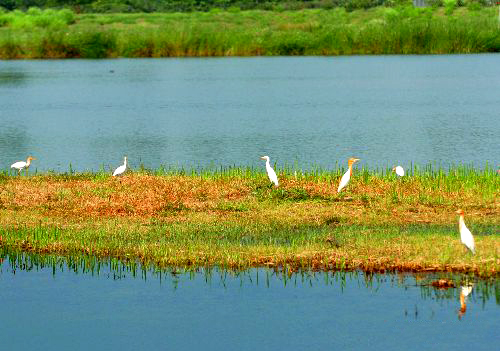The World Wetlands Day 2009 is being celebrated this year with a theme of "Upstream-Downstream: Wetlands connect us all". The focus is designed around the theme of wetlands in the context of river basin management and the role wetlands play in their surrounding environments.
 |
|
File photo: The World Wetlands Day 2009 is being celebrated this year with a theme of "Upstream-Downstream: Wetlands connect us all". |
A press release issued by International Center for Integrated Mountain Development (ICIMOD) headquarter in Nepali capital Kathmandu, on Monday said that the slogan for this year 2009 is very relevant to the mountain context of the Himalayan region.
Every year, The World Wetlands Day is celebrated on Feb. 2.
"The upstream land and water management activities in the mountains affect both the water availability and the risks for downstream communities. The wetlands in the mountain regions connect the upstream and downstream physical systems," according to the release.
At the local level, wetlands in the mountains and their associated services play a vital role in supporting the livelihoods of local communities, and especially activities like fishing and agriculture. At the river basin scale, wetlands are important for balancing the hydrological regimes or water balance of the river systems.
The press statement of ICIMOD stressed on the need of increased attention to largely biophysical aspects of wetlands. "There is a need to review conventional policy-program processes that in the past have created and increased inequalities between highlands and lowlands through economic links that are unfavorable to highlands and uncompensated ecological and economic flows from highlands to lowlands," said the release.
According to the release, the Himalayan wetlands, and especially the high altitude wetlands, are under great threat from climate change.
These wetlands appear to be shrinking at a higher rate than wetlands in other parts of the world. The loss of glaciers will also affect the wetlands and lead to significant decreases in the availability of freshwater in the region, which is a source of freshwater for rivers that serve close to 20 percent of the world' s population.
Together with its regional member countries, ICIMOD is focusing on development of the information and knowledge needed to improve our understanding of the wetland resources of the Himalayan region to provide a sound basis for developing such plans and strategies, the release said.
ICIMOD is a regional knowledge development and learning center serving the eight regional member countries of the Hindu Kush- Himalayas Nepal, China, India, Afghanistan, Bangladesh, Bhutan, Myanmar and Pakistan.
(Xinhua News Agency February 2, 2009)